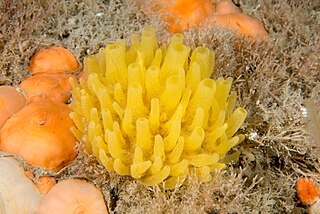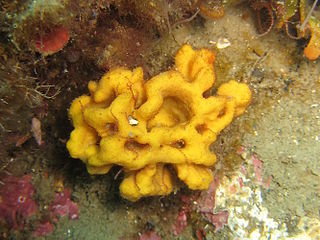
Geodia is a genus of sea sponge belonging to the family Geodiidae. It is the type genus of its taxonomic family.

Polymastia is a genus of sea sponges containing about 30 species. These are small to large encrusting or dome-shaped sponges with a smooth surface having many teat-shaped projections (papillae). In areas of strong wave action, this genus does not grow the teat structures, but instead grows in a corrugated form.

Halichondria is a genus of sea sponges belonging to the family Halichondriidae. These are massive, amorphous sponges with clearly separated inner and outer skeletons consisting of bundles of spicules arranged in a seemingly random pattern.

Axinella is a genus of sponges in the family Axinellidae first described in 1862 by Eduard Oscar Schmidt. Species of Axinella occur in the Indian and Pacific Oceans. Most of these sponges are smaller than 20 cm, and have a yellow or orange colour.

Stelletta is a genus of sea sponges belonging to the family Ancorinidae.

Clathria is a large genus of demosponges in the family Microcionidae.

Haliclona is a genus of demosponges in the family Chalinidae.

Auletta is a genus of sponges in the family Bubaridae.

Myxilla is a genus of demosponge belonging to the family Myxillidae. These sponges usually form encrustations on rock surfaces.

Crella is a genus of marine demosponges in the family Crellidae.

Craniella is a genus of marine sponges in the family Tetillidae.

Tedania is a genus of sea sponges in the family Tedaniidae.

Mycale is a genus of demosponge with 240 recognised species in 11 subgenera. It has been a large genus with multiple subdivisions since it was first described in 1867.

Antho is a genus of sponges belonging to the family Microcionidae. The genus has a cosmopolitan distribution and is known from virtually all parts of the global ocean. There are 62 species in five subgenera.

Iophon is a genus of sponges belonging to the family Acarnidae. The genus has a cosmopolitan distribution.

Coelosphaeridae is a family of sponges belonging to the order Poecilosclerida. Species are found across the globe.

Acarnus is a genus of sponges belonging to the family Acarnidae. The genus has almost cosmopolitan distribution.

Phakellia is a genus of sponges belonging to the family Bubaridae. The genus has a cosmopolitan distribution.
Hamacantha is a genus of sponges in the family Hamacanthidae. This species in this genus differ from those in the other genera in this family through the presence of diancistras, distinctive microscleres. These are thought to aid in framing the skeleton by joining monactine megascleres. This genus contains 30 species in three subgenera.

Phorbas is a genus of demosponges belonging to the family Hymedesmiidae.



















